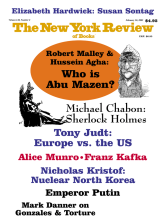I want to share with your readers a story I’ve come across here in Washington that may be of interest.
Vladimir Lytvyn is the speaker of the Ukrainian parliament, or Rada. As speaker, he’s one of the most powerful people in government, more powerful, for all practical purposes, than Dennis Hastert is in the United States. Lytvyn also served until 2002 as President Leonid Kuchma’s chief of staff and, for that reason, was widely reviled by democratic opposition groups who believed (correctly) that Kuchma was the major roadblock to reform. (Not incidentally, Lytvyn was caught on tape by a presidential security guard in a conversation with Kuchma discussing the now famous murder of the Georgian-Ukrainian journalist Heorhiy Gongadze.)
Last month, between the first and second rounds of voting in the Ukrainian presidential election, Lytvyn made a brief, low-profile trip to Washington, where he met with Colin Powell, Condoleezza Rice, Senators Richard Lugar and John McCain, and Representative Henry Hyde, the chairman of the House International Relations Committee. (I was told all this by a knowledgeable American source here in Kiev and confirmed it in interviews with Lytvyn and a senior Western diplomat.) While it has been reported in the Ukrainian press, the trip has apparently gone entirely unnoticed in the United States. Even a Republican source with close ties to the Ukrainian embassy in Washington was unaware that Lytvyn had been in town. I learned in Kiev that the senior diplomat was primarily responsible for the trip. He acknowledged in our interview that he had some time ago identified Lytvyn as a potential key US ally after a series of votes in December 2003 and April of this year; but the diplomat mostly played down his role, saying Lugar had officially invited Lytvyn to Washington.
In any event, the Americans apparently thought Lytvyn might be able to help Viktor Yushchenko win some key support in the Rada should there be a close runoff, demonstrations, and/or a constitutional crisis—all of which, as we now know, took place. The hope was (a) to encourage Lytvyn to do everything possible to help Yushchenko; and (b) to send a signal to the democratic opposition here in Ukraine that the US was on its side (while not stating so directly for fear of alienating the Russians). Interestingly, on December 1, Lytvyn permitted the Rada to hold the no-confidence vote against Prime Minister Yanukovich’s government; this proved to be a critical development that was soon followed by the Supreme Court’s ruling that the runoff was invalid because of fraud.
All this helps, I think, to fill out the very nebulous story behind Yushchenko’s victory on December 26. It also dispels notions that the United States has sat idly by while the Europeans—notably, the Poles and the Lithuanians—have taken the lead in ushering in democratic reform.
I should add that in our interview, Lytvyn wanted to make it clear that he is now working with the West. He said—for the first time, as far as I can ascertain—that he supports Ukrainian entry into the EU and NATO, a huge break from the position of Kuchma and his allies. He also tried to sound as Republican as possible, touting free markets and free peoples, etc.
Finally, I think this story is about more than a single election. It speaks to the larger questions of Ukraine’s political evolution (with a view toward the parliamentary elections here in 2006), US diplomacy in the former Soviet Union, and the debate taking place in the United States about the role the State Department has played in furthering US goals (a role that has been brought into question by some critics, among them some well-known neoconservatives).
This Issue
February 10, 2005



